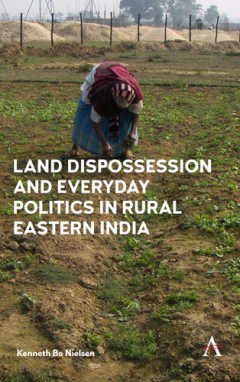Land Dispossession and Everyday Politics in Rural Eastern India
By Kenneth Bo Nielsen
Other Formats Available:
- About This Book
- Reviews
- Author Information
- Series
- Table of Contents
- Links
- Podcasts
About This Book
Over the past decade India has witnessed a number of new land wars that have centred crucially on the often forcible transfer of land from small farmers or indigenous groups to private companies. Among these many localized and dispersed land conflicts, the land war that erupted in Singur, West Bengal, in 2006, went on to make national headlines and become paradigmatic of many of the challenges and social conflicts that arise when a state-led policy of swiftly transferring land to private sector companies encounters resistance on the ground.
‘Land Dispossession and Everyday Politics in Rural Eastern India’ is about the movement of Singur’s unwilling farmers to retain and reclaim their farmland. The book analyses the practical, representational and political work that the unwilling farmers engaged in as they have sought to mobilize public opinion; represent and justify their claims to land to a larger public; forge useful political alliances; engage and manoeuvre the legal system; navigate internal differences and discrepant interests; and simply keep the movement together on the ground. How did Singur’s unwilling farmers frame their movement to save the farmland? Which notions of development and justice did they draw on? How did they navigate everyday social cleavages and conflicts along the lines of caste, class and gender? Who led, who followed, and who was silenced? By engaging these questions through the prism of everyday politics, ‘Land Dispossession and Everyday Politics in Rural Eastern India’ makes an important empirical and ethnographic contribution to the still-limited anthropological understanding of the localized dynamics of India’s new land wars.
Reviews
‘Nielsen is also very good at depicting the complex ecology of political parties, non-governmental organisations (NGOs) and activists from whom the Singur farmers and workers took support, and the behind-the-scenes deliberations and negotiations this involved. … This is a must read for anyone interested in social movements and the politics of land and development in contemporary India.’
—Michael Levien (2019): Land Dispossession and Everyday Politics in Rural Eastern India, South Asia: Journal of South Asian Studies, DOI:10.1080/00856401.2019.1557827
‘Nielsen’s work is both ambitious in scale and innovative in approach. …The book will offer new theoretical and methodological directions for scholars working not only on displacement-dispossession and land wars, but also for a wider audience interested in the development paradoxes of the global South.’
—Ritanjan Das (2019): Land Dispossession and Everyday Politics in Rural Eastern India, Forum for Development Studies, DOI: 10.1080/08039410.2019.1575006
"Nielsen’s book gives a rich account of the internal dynamics and politics of a social movement revealing its ambivalences and ambiguities"
—Sirpa Tenhunen (2018): 'Land Dispossession and Everyday Politics in Rural Eastern India,' "Journal of Contemporary Asia," DOI: 10.1080/00472336.2018.1526961
‘Nielsen’s ethnographic analysis sheds light on the micro-politics of caste, class, gender and leadership that are all too often neglected in the studies of land protests.’
—Lucia Michelutti, Reader in Anthropology, University College London, UK
‘Land Dispossession and Everyday Politics in Rural Eastern India deals with […] the question of land in the agenda of collective politics. […] The book is enriched with the creative tension between the pulls of analysis flowing from political economy and those of an ethnographic understanding of politics.’
—Ranabir Samaddar, Director, Mahanirban Calcutta Research Group, Kolkata, India
‘Kenneth Bo Nielsen provides a close, careful analysis of the Singur story […]. For those who want to understand how land wars can make or break governments and the dominant models of economic growth that they promote, this book is highly recommended.’
—Amita Baviskar, Professor of Sociology, Institute of Economic Growth, Delhi, India
Author Information
Kenneth Bo Nielsen is associate professor of South Asia Studies at the Department of Culture Studies and Oriental Languages, University of Oslo, Norway.
Series
Table of Contents
List of Tables; Acknowledgements; List of Abbreviations; Introduction; Chapter 1: Situating Singur; Chapter 2: Land, Identity, and the Politics of Representation; Chapter 3: Law, Judicialisation and the Politics of Waiting; Chapter 4: Class, Caste and Community; Chapter 5: Gendered Mobilisation: Women as Activists and Symbols; Chapter 6: Activist Leadership; Chapter 7: Ma, Mati, Manush - Mamata; Conclusion; Glossary; Bibliography; Index.
Links
● Commonwealth & Comparative Politics: Book Review
● South Asia: Journal of South Asian Studies
Stay Updated
Information
Latest Tweets



